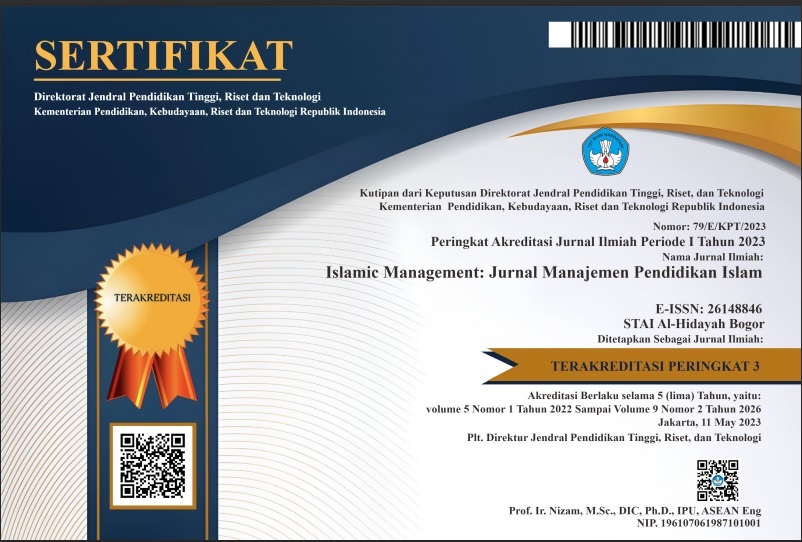VALUES OF MORAL EDUCATION IN THE BOOK USWATUN HASANAH BY NUKMAN SULAIMAN
DOI:
https://doi.org/10.30868/im.v8i01.8203Keywords:
Values, Education, Morals, Nukman SulaimanAbstract
References
Ahmad. (2002). Implementasi Akhlak Qur’ani. Bandung: PT Telekomunikasi Indonesia.
al-Abrasyi, Moh. Athiyah. (1996). Dasar-dasar Pokok Pendidikan Islam. Jakarta: Bulan Bintang.
Aziz, Erwati. (2003). Prinsip-prinsip Pendidikan Islam. Solo: PT Tiga Serangkai Pustaka Mandiri.
Azra, Azyumardi. (2012). Pendidikan Islam: Tradisi dan Modernisasi di Tengah Tantangan Millenium III. Jakarta: Kencana.
Dalimunthe, M. A. (2022). "Keterampilan Komunikasi Antarbudaya Mahasiswa Malaysia di Kota Medan." Langgas: Jurnal Studi Pembangunan 1(2): 82-89.
Dalimunthe, M. A., A. M. Syam, A. Suhendar, and N. M. Al-Mujtahid. (2024). "Deconstructing Islamic Cyberculture: Mitigating Inferiority and Cancel Culture in Virtual Space." OPINI: Journal of Communication and Social Science 1(2): 12-26.
Dalimunthe, M. A., H. Pallathadka, I. Muda, D. Devi Manoharmayum, A. Habib Shah, N. Alekseevna Prodanova, M. Elmirzayevich Mamarajabov, and N. Singer. (2023). "Challenges of Islamic Education in the New Era of Information and Communication Technologies." HTS Teologiese Studies / Theological Studies 79(1). https://doi.org/10.4102/hts.v79i1.8608.
Darajat, Zakiah, dkk. (2011). Ilmu Pendidikan Islam. Jakarta: PT Bumi Aksara.
Daulay, Haidar Putra. (2012). Kapita Selekta Pendidikan Islam di Indonesia. Medan: Perdana Publishing.
Harahap, Syahrin. (2011). Metodologi Studi Tokoh Pemikiran Islam. Jakarta: Prenada Media Group.
Hasbullah. (1996). Kapita Selekta Pendidikan Islam. Jakarta: Raja Grafindo Persada.
Humaizi, Hasan NNN, M. A. Dalimunthe, and E. Ramadhani. (2024). "Harmony in Virtual Space: Forum Kerukunan Umat Beragama (FKUB) Development Communication in Creating Digital Literacy Based on Religious Moderation." Journal of Infrastructure, Policy and Development 8(7): 4299. https://doi.org/10.24294/jipd.v8i7.4299.
Indainanto, Y. I., M. A. Dalimunthe, H. Sazali, Rubino, and S. Kholil. (2023). "Islamic Communication in Voicing Religious Moderation as an Effort to Prevent Conflicts of Differences in Beliefs." Pharos Journal of Theology 104(4). https://doi.org/10.46222/pharosjot.104.415.
Irwan, Desnelita Y., W. Susanti, F. Rizal, and A. R. Ritonga. (2023). "The Implementation of Collaborative Project-Based Learning Model with Inquiry Process Using E-Learning in Higher Education." Educational Administration Theory and Practice 29(1): 90–101. https://doi.org/10.48047/rigeo.11.09.187.
Mailin, M., M. A. Dalimunthe, and A. Zein. (2023). "Exploring Intercultural Communication in Indonesia: Cultural Values, Challenges, and Strategies." Journal of Namibian Studies: History Politics Culture 33: 2804-2816.
Maskawaih. (2011). Tahzibul Akhak. Beirut: Al-Jamal.
Nasharuddin. (2015). Akhlak: Ciri Manusia Paripurna. Jakarta: PT Rajagrafindo Persada.
Nata, Abudin. (2008). Manajemen Pendidikan (Mengatasi Kelemahan Pendidikan Islam di Indonesia). Jakarta: Kencana.
Nizar, Samsul. (2002). Filsafat Pendidikan Islam Pendekatan Historis, Teoritis, Dan Praktis. Jakarta: Ciputat Pers.
Patton, M. Q. (2009). Metode Evaluasi Kualitatif. Yogyakarta: Pustaka Pelajar.
Rahmat, H. K., Muzaki, A., & Pernanda, S. (2021, March). "Bibliotherapy as An Alternative to Reduce Student Anxiety During Covid-19 Pandemic: a Narrative Review." Proceeding International Conference on Science and Engineering 4: 379-382.
Rahmat, H. K., Nurmalasari, E., Pyuranti, L. D., & Syifa’ussurur, M. (2020). "Understanding the Counselor's Competence in Guidance and Counseling Services with Inclusive Perspective." SSRN. https://ssrn.com/abstract=3739078.
Rofiah, Nurul Hidayati. (2016). "Desain Pengembangan Pembelajaran Akidah Akhlak Di Perguruan Tinggi." Fenomena 8(1).
Rohmah, Siti. (2021). Akhlak Tasawuf: Memahami Esensi, Upaya Pakar Dan Ide Suatu Praktik Yang Berkembang Dalam Tasawuf. Jawa Tengah: NEM.
Rostitawati, Tita. (2016). "Konsep Pendidikan Akhlak Anak Dalam Perspektif Al-Ghazali." Tadbir: Jurnal Manajemen Pendidikan Islam 4(1).
Sari, M., & Asmendri. (2018). "Penelitian Kepustakaan (Library Research) dalam Penelitian Pendidikan IPA." Penelitian Kepustakaan (Library Research) Dalam Penelitian Pendidikan IPA 2(1): 15.
Sikumbang, A. T., M. A. Dalimunthe, S. Kholil, and N. F. Nasution. (2024). "Digital Da'wah Indonesia Ulema in the Discourse of Theology." Pharos Journal of Theology 105(1): 1-14. https://doi.org/10.46222/pharosjot.1051.
Syam, A. M., M. A. Dalimunthe, A. Suhendar, and R. F. A. K. Rambe. (2024). "Islamic Philosophy: A Comparative Perspective Between Ibnu Khaldun and Karl Marx." SYAHADAT: Journal of Islamic Studies 1(2): 55-72.
Zed, Mustika. (2017). Metode Penelitian Kepustakaan. Jakarta: Yayasan Pustaka Obor Indonesia.
Downloads
Published
How to Cite
Issue
Section
Citation Check
License
Copyright (c) 2025 Aisyah Aminda, Azizah Hanum OK, Junaidi Arsyad

This work is licensed under a Creative Commons Attribution-ShareAlike 4.0 International License.
Authors who publish with this journal agree to the following terms:
- Authors retain copyright and grant the journal right of first publication with the work simultaneously licensed under a Creative Commons Attribution License that allows others to share the work with an acknowledgment of the work's authorship and initial publication in this journal.
- Authors are able to enter into separate, additional contractual arrangements for the non-exclusive distribution of the journal's published version of the work (e.g., post it to an institutional repository or publish it in a book), with an acknowledgment of its initial publication in this journal.
- Authors are permitted and encouraged to post their work online (e.g., in institutional repositories or on their website) prior to and during the submission process, as it can lead to productive exchanges, as well as earlier and greater citation of published work (See The Effect of Open Access).






